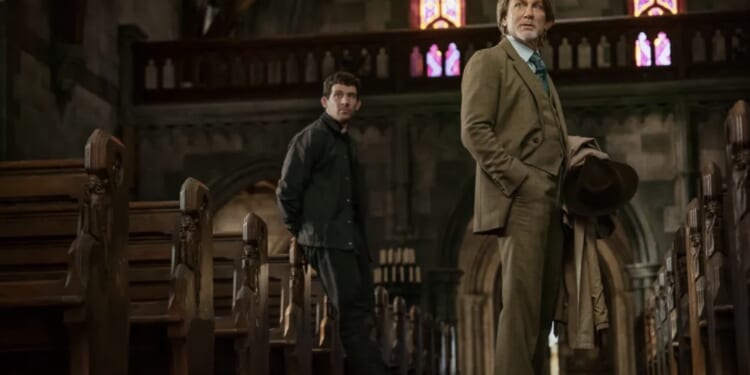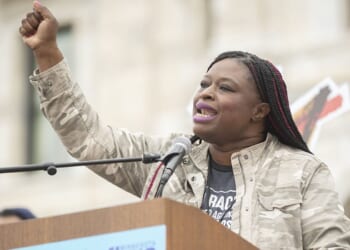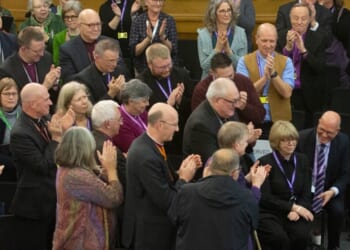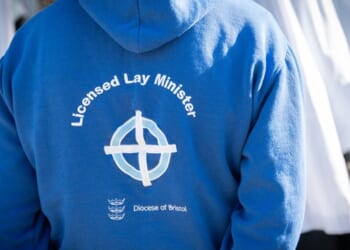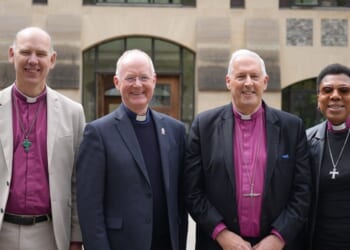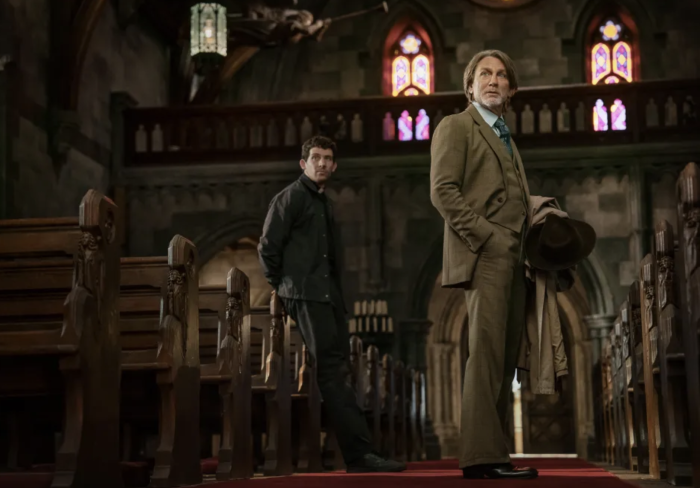
Rian Johnson still remembers the youth-group nights in Orange County: the prayers, the Christian alt-rock bands, the deepening of a faith that framed his worldview. He remembers the beauty of it; friendship, community and grace, but also the darker edges, the distortions that can warp conviction into control.
“I grew up very Christian,” the 51-year-old director and founder of T-Street Productions told The Christian Post. “I wasn’t just raised in a religious household. My relationship with Christ was really how I framed the world around me through my childhood, through my teenage years, into my early 20s, and it was a big, big part of my identity and my life.”
Johnson, the director behind “Star Wars: The Last Jedi,” is no longer a believer. But according to the director, that past has never fully left him — and has become the creative engine behind his latest film, “Wake Up Dead Man,” the third installment in his “Knives Out” mystery saga. This time, Johnson wades directly and unapologetically into religion, its beauty, power, corruption and ultimately, hope.
“It’s very personal to me,” he said. “I’m not a believer anymore, but it’s something that carried through my whole life.”
Set in the fictional upstate New York community of Chimney Rock, detective Benoit Blanc (Daniel Craig) returns for a murder investigation centered around Father Jud Duplenticy (Josh O’Connor), a small-town Catholic priest whose moral compass throws Blanc’s cynicism off-balance, and whose foil, the manipulative Monsignor Jefferson Wick (Josh Brolin) embodies the spiritual distortions Johnson witnessed in his youth.
The parishioners, devout churchgoer Martha Delacroix (Glenn Close,) groundskeeper Samson Holt (Thomas Haden Church), lawyer Vera Draven (Kerry Washington), aspiring politician Cy Draven (Daryl McCormack), town doctor Nat Sharp (Jeremy Renner), bestselling author Lee Ross (Andrew Scott), and concert cellist Simone Vivane (Cailee Spaeny) form a congregation of believers, skeptics and strugglers.
Their resentments, inner motives and secrets surface gradually throughout the film, often through confessional encounters with the young priest.
“Wake Up Dead Man” is not faith-based; it’s a dark, wintry whodunnit rated PG-13 for violent content, bloody images, strong language, some crude sexual material and smoking. But it also includes some of the most interesting and earnest religious elements Johnson has ever put on screen.
The director was, by his own description, “a youth-group kid,” raised in the era of DC Talk, The Prayer Chain, and his personal favorite, Black and White World.
“I still pull out their albums and listen to them to this day,” he said. “They rocked. It was a huge, huge day when they came to our youth group and did a concert that night. We were all trying to play it cool, but Black and White World was there.”
His closest friends today are the ones he met there. “They came to the premiere,” he said. “We were all reminiscing about the good days of Christian alt-rock.”
According to Johnson, it was that early faith that shaped his internal life: Christianity provided order, meaning, and what he describes as “a relationship that framed everything.” The departure from belief in adulthood was a gradual shift and not an abrupt severing, he said, but that lingering familiarity formed the emotional backbone of his latest script.
“I don’t want to make it sound grander than it is,” he said. “But I did feel a little confidence to attempt it, because it’s personal. And because I wanted to say something that had a generous spirit.”
“My big concern was landing the tone,” Johnson added. “I wanted a multi-faceted conversation about faith. I didn’t want it to feel didactic or finger-waggy at either side. I also didn’t want it to tiptoe around everything just to avoid offense. … That was the real challenge, making something big and entertaining while keeping a generous spirit at the center.”
At the heart of the story are two Catholic clergymen: Father Jud, a young priest marked by humility and a deep understanding of grace stemming from his checkered past, and Monsignor Wicks, who weaponizes Scripture to protect his influence and feed his ambition and greed.
Johnson said both characters emerged from what he observed growing up, but stressed they’re both “distillations,” adding: “I didn’t know anyone exactly like Father Jud, and I didn’t know anyone exactly like Monsignor Wicks. But both come from clouds of things I experienced when I was a believer.”
The negative elements embodied by Wicks were rooted in real encounters, he said, as were the virtues embodied by Jud: grace, gentleness the capacity for self-examination. Still, Father Jud is not perfect; Johnson said he intentionally avoided turning him into an unrealistic emblem of goodness.
“He has his own history with violence, his own struggles,” Johnson said. “I wanted him to be real. All the Christians I know are real people. They struggle. That’s what makes their faith real.”
He delivers a line in the film, Johnson said: “The world needs the peace of Christ so bad.”
“When Father Jud says that, it’s not about doctrine,” he said. “It’s about the essence of Christ’s teachings. Not us versus them. Loving your enemy. Extending grace. Opening your arms. … “In every corner of society right now, it feels like that’s what we need,” he said. “Writing a character who embodied that felt therapeutic.”
“There were so many youth pastors and friends who shaped me,” he said. “And my own personal walk with Christ. Those are things I still feel the world needs more of.”
One of the film’s most moving scenes occurs when a woman asks Father Jud, mid-case, to pray for her mother, who is on hospice care and dying. The priest stops everything to pray over the woman, over the phone, and her mother, a scene Johnson said he drew from real life.
“I sat down with five young priests in Denver,” he said. “They talked about how, when they go to the grocery store wearing a collar, they’re at work. People come up, crying about a sick family member. Or shouting at them. That stayed with me.”
So when Father Jud becomes swept up in Blanc’s gleeful hunt for the culprit, Johnson said he wanted to implement a scene that interrupted the game with real human need.
“The idea of having out of the blue that kind of encounter happen and having it reset him and realize, ‘Wait a minute, this is the opposite of what I’m here to do. I’m here to serve the human need in front of me, not to play this murder mystery game.’ The idea of doing that in the middle of a murder mystery felt kind of exciting to me, and also felt emotionally resonant.”
Blanc, with his signature Southern drawl, has always been the moral compass of the “Knives Out” series, but he is an avowed nonbeliever, something he repeatedly stresses in the film, and is initially combative toward the priest.
“Blanc is very much a non-believer. He’s very cynical about the church, and he comes in kind of with guns blazing a bit. He kind of doesn’t hold back in his first scene with Jud. And then Jud, I think, with generosity and grace, answers him back, and that’s where the relationship starts, on opposite ends of the fence.”
“For me, it was important that Blanc doesn’t convert,” Johnson said. “That would feel dishonest. But he does learn something: the human grace of giving up something precious to help someone who maybe deserves it the least but needs it the most.”
But the film builds a relationship between Black and Father Jud, and by the end, the men remain on opposite sides of the theological fence, yet linked by what they’ve shared.
“They don’t let the disagreement stop them from connecting,” Johnson said. “That felt like something worth showing right now.”
Perhaps the greatest surprise for Johnson was how spiritually taxing and spiritually illuminating writing the film became. To make Father Jud real, Johnson had to go back, emotionally and psychologically, to the believer he once was as a younger man, and the process was life-changing.
“When I first started writing Father Jud, it wasn’t working,” he said. “I realized it was because I was writing him from my perspective today.”
“Writing is almost like acting,” he said. “You have to inhabit the character. I had to bring myself back to that place. I can’t say the whole process, like with Blanc, ended for me with a conversion. But for me, I found it beyond nostalgic. It was incredibly moving. And definitely changed me inside, just reconnecting with that part of myself and reconnecting with that time and with the things that I drew from faith in that moment in my life.”
Johnson acknowledged that tackling religion in a big Hollywood film is risky, yet he stressed he wants the movie’s exploration of faith and religion, both the good and the bad, to invite reflection and remind audiences of the beauty of grace.
“The world is noisy,” he added. “Angry. Fractured. But grace still matters, maybe more than ever.”
“Wake Up Dead Man: A Knives Out Mystery” opens in select theaters on Wednesday, Nov. 26 and will stream on Netflix on Dec. 12.

